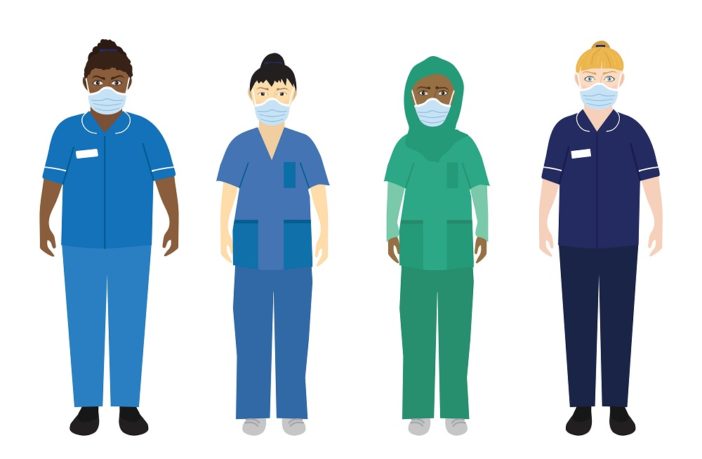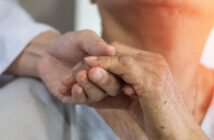During the midst of the pandemic, nurses and other frontline staff were the subject of praise from the government and public with the weekly NHS clap, dedicated shopping hours and shared gratitude for their lifesaving work. But, with restrictions beginning to ease and the public eager to return to normality, how long will nurses remain at the forefront of our mind? Dr Rebecca Garcia, Lecturer in Nursing at The Open University shares her thoughts.
 Since 2009, it has been a requirement for nurses to be qualified to degree level. Nurses from all fields of practice are highly skilled professionals, with a magnitude of knowledge that is vital to the healthcare sector. However, despite the extent to which nurses are educated, the public perception of the nursing profession has been tainted by media coverage, portraying nurses in a subordinate role to doctors, as their ‘handmaiden’ and other negative stereotypes (Bridges, 2004; Gordon and Nelson, 2005). Prior to March 2020, the majority of the public had little awareness of nurses true roles (Girvin, Jackson and Hutchinson, 2016; Hayes, 2019), unless they had the misfortune of being unwell themselves (or that of a close family member).
Since 2009, it has been a requirement for nurses to be qualified to degree level. Nurses from all fields of practice are highly skilled professionals, with a magnitude of knowledge that is vital to the healthcare sector. However, despite the extent to which nurses are educated, the public perception of the nursing profession has been tainted by media coverage, portraying nurses in a subordinate role to doctors, as their ‘handmaiden’ and other negative stereotypes (Bridges, 2004; Gordon and Nelson, 2005). Prior to March 2020, the majority of the public had little awareness of nurses true roles (Girvin, Jackson and Hutchinson, 2016; Hayes, 2019), unless they had the misfortune of being unwell themselves (or that of a close family member).
In late 2019, the World Health Organisation (WHO) were making their final plans for ‘2020, The Year of The Nurse’ to celebrate Florence Nightingale’s bicentennial year and showcase nursing across the world; but by December 2019, coronavirus (COVID-19) had made an untimely appearance, demanding attention from the public and healthcare staff, albeit in different ways. This placed the nursing profession at centre stage, although not in the way that WHO had envisaged when planning its campaign.
In the UK, the NHS responded by realigning to meet the expected large numbers of acutely ill patients, with nurses rapidly trained and/or redeployed to meet the demand of COVID-19 cases. Third year student nurses were asked to volunteer to help; a staggering 22,000 signed up to the temporary Nursing and Midwifery Council register in just three weeks, while a further 10,000 ex-nurses returned to the profession to support the pandemic effort (Ford, 2020).[1]
Media reports captured nurses caring for patients in a variety of settings, from acute and highly technical environments such as intensive care wards to older residents in nursing homes. The public was able to experience first-hand the reality of nursing and how crucial nurses are. This previously and often-unseen view from inside hospitals and caring facilities was a refreshing insight that positioned nursing as central to the care of patients.
In response to the public’s increasing awareness and appreciation of NHS staff and key workers, including nurses, organisations and local communities have shown gratitude with the Thursday evening street-wide applause, posters and signs displayed at windows. NHS employees have seen a wealth of commercial privileges to acknowledge their valued contribution in saving lives during COVID-19. However, the government remains unsupportive of salary reviews for nurses, claiming that nurses had recently received a significant pay increase, when in real terms the pay review was merely bringing nurses up-to-date following many years of austerity measures, including pay freezes on wages.
It is widely accepted that there are just not enough nurses, yet, figures are showing that numbers of qualified nurses have risen slowly over recent years. As of January 2020, there were 298,309 registered nurses employed across NHS trusts in the UK (Workforce Statistics, 2020), with growing numbers of male applicants. Following the recent positive portrayal of the nursing profession during COVID-19, it is hoped that larger numbers of aspiring nurses and nursing associates will join this highly rewarding profession; but without fairer pay, could this be a barrier to attracting interested applicants? It’s important that we maintain the momentum of a more accurate portrayal of nursing, keeping the importance of nursing and its standing as a highly skilled profession at the top of the agenda in parliament, within the sector and more widely in the public domain. Let’s not forget what nurses have done for us throughout the pandemic and continue to deliver as we step back to normality.
[1] Figures correct at the time of writing
Addendum – May 2021
To mark International Nurses Day 2021, Rebecca provided an update to her piece from last year.
The media remains central to shaping the public perception of nursing, with the ‘hero’ image remaining strong as the pandemic continues. More still needs to be done to actively address the outdated, stereotyped and misrepresented images of nursing.
In 2018, Lord Crisp and Baroness Watkins [2] suggested a number of useful strategies to increase the public profile of nursing, which remain relevant today:
- Making nursing central to health policy in every country and raising the profile of the nurse profession
- Increase recruitment of nurses in education and training
- Develop nurse leadership skills
- Enable nurses to work to their potential
- Obtain evaluations on the impact of nursing on access, cost and quality
- Develop nursing to have a triple impact on health, gender equality and economies
The International Council of Nurses, NursingNow campaign has made a start on making such changes globally over the last three years, and in June 2021 the Nursing Now Challenge (NNC) will carry forward the ambitious mandate by working with health employers around the world to create leadership development opportunities for 100,000 nurses and midwives in more than 150 countries. However, there is still a need for the nursing sector to both educate and work alongside mainstream media to reinvent the image of nurses and to ensure it portrays accurate and positive accounts of what the profession entails – this will in turn impact the wider public perception.
[2] Crisp, N., & Watkins, M. (2018). The triple impact of nursing. International Journal of Nursing Studies, 78, A3–A4. https://doi.org/10.1016/j.ijnurstu.2017.05.001
Find out more
About nursing at The Open University



